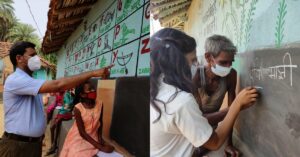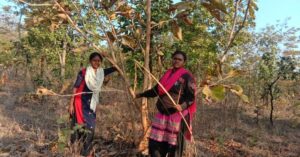Housewife to Hero: Meet the Champion Mukhiya of Bokaro District, Sarita Devi
In the last three and half years, change agents like Mukhiya Sarita Devi have done exceptionally well in rural Jharkhand.
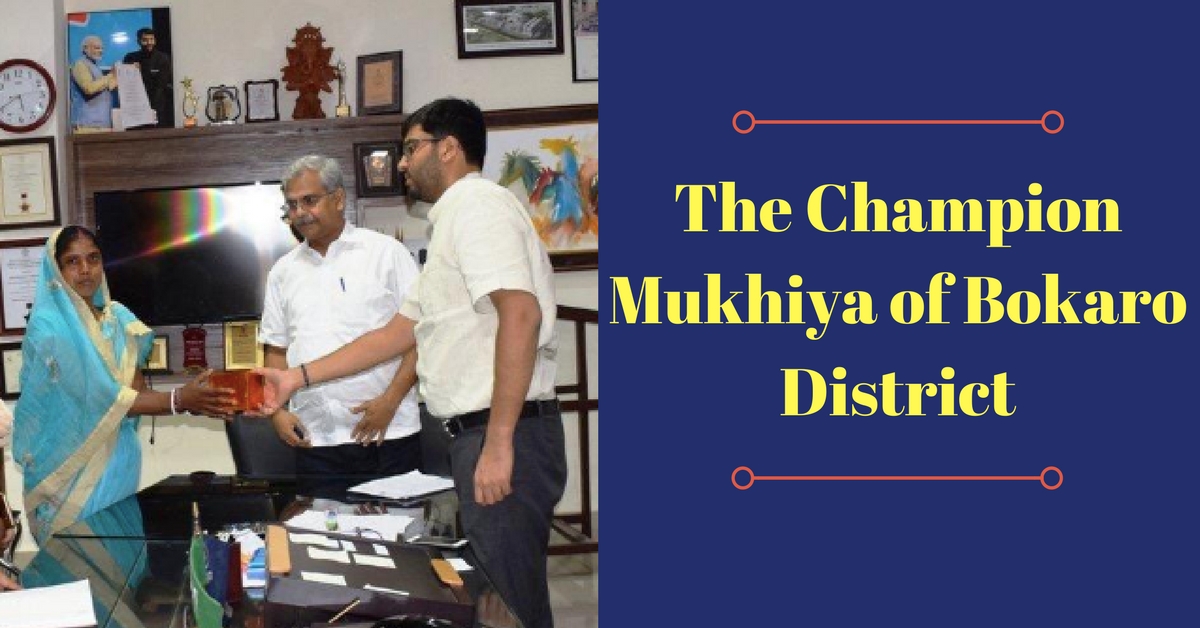
When approached to meet her, despite her recent limelight as one of the ‘Champion Mukhiyas’ at the national level, a small petite unassuming lady in her early 30s comes out of her small unostentatious house in Bokaro.
She is the first female Mukhiya of the Gram Panchayat Durgapur – which is a part of the Kasmar block in Bokaro, Jharkhand.
Sarita Devi took over as Mukhiya of her Durgapur Panchayat in 2015 and is now the Gram Panchayat head of four revenue villages (Rajaswa Gram) that encompasses some three thousand people.
The Durgapur panchayat has traditionally been an agriculture-based economy with a population mostly from backward communities.
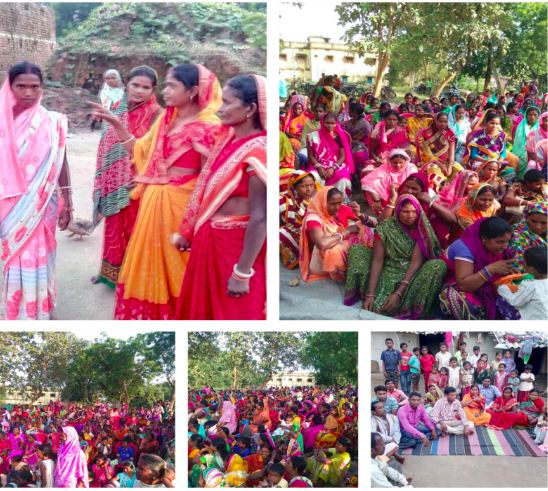
Ram Kishun, the husband of Sarita Devi, proudly states that his wife is one of the few literate women of his village who successfully balances her personal and professional life. She hails from a nearby Hanslata village of the Daantoo panchayat – which falls under the same Kasmar block as her in-laws.
She proudly speaks of her motherhood bestowed through two daughters and a son who are her strength and the reason for her existence as well.
The 31-year-old Sarita Devi starts her day at 4:30 am in the morning by feeding the cattle. Within two hours, she is done with her daily household chores by finishing off her cooking and even sending her kids to school. By 7 am she sets off to attend to the problems of the people in her Panchayat.
You may also like: Meet Mittal Patel, Who Skipped Her IAS Dreams to Uplift India’s ‘Criminal’ Tribes
Apart from making herself available in the Panchayat Bhawan at least twice a week, she prefers to take governance to the doorstep of her people. She travels extensively in her four revenue villages (Rajaswa Gram) and likes to connect with people personally. According to her, an informal connect with people works well in a rural setting. This allows people to speak out their minds and share their day-to-day problems.
The Mukhiya makes it emphatically clear that being a woman and belonging to a backward community, life was always demanding. Though literate, she, as a woman, had to go through the gruelling societal restrictions that take an exceedingly serious tone at the village level.
Life took a u-turn for her when the State government decided to implement reservation for women at the Panchayat level elections from 2010.
The decision to stand for the Mukhiya elections changed her life. Though elders in her village scorned at her, the support of her husband Ram Kishun, an ex-Panchayat Samiti member, convinced her to contest, and win, the Panchayat elections.
One of the many challenges Sarita Devi experienced after taking over as Mukhiya was establishing an identity for herself and casting off the aspersions that people have for an ordinary woman who has been a housewife all through her life. It was a herculean task for her to prioritise the problems of the villages and to ensure the development of her Panchayat.
As soon as she took over, she was confronted with the usual problems of lack of proper roads, drainage system, poverty and the like. Along with addressing those issues, Sarita Devi actively implements various Govt. schemes – mainly the Swachh Bharat Abhiyan (SBA) and Pradhan Mantri Awaas Yojana (Gramin).
For this, the most important challenges that confronted her was to create awareness amongst the villagers. To enable this, she participated in various training programs that were organised under the aegis of District Administration in collaboration with the Rural Development Dept. and UNICEF.
More importantly, several women’s’ groups were created in her Panchayat by involving like-minded and committed women for implementing the beneficial schemes in an active and time-bound manner. She spearheaded many awareness programs like Sandhya Choupal (evening talk with the villagers), organising meetings at Panchayat Bhawan and participating in school level and Panchayat level cleanliness programs. She also conducted meetings and listened to grievances of the villagers.
Repeated awareness sessions with the villagers and endless cajoling started changing minds. Slowly her statements motivated them to seek the Rs 12000 grant under the SBA to make toilets.
In the last three and half years, change agents like Mukhiya Sarita Devi, have done exceptionally well in rural Jharkhand to bring about an appreciable change in the rural population.
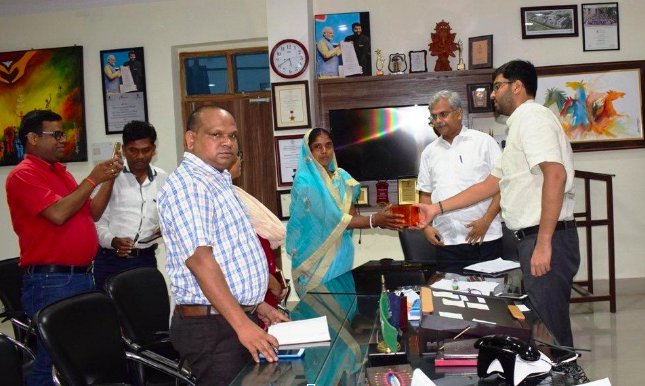
Sarita Devi quickly became known for pursuing the principles of village democracy seriously. In no time her colossal commitment and collaborative efforts through the Gram Sabha started getting noticed, and her zeal caught the attention of the then District Collector Mr Rai Mahimapat Ray.
A unique and creative brainchild of Mr Ray, ‘Coffee with Collector’, was used to recognise the efforts of Sarita Devi.
Impressed with her accomplishments, the District collector proposed her name for an award in New Delhi during the “Swachhata Hi Seva” program that was held on October 2, 2017.
She received the award for coordinating the construction of 800 quality toilets within a short span of fifteen days at the Durgapur Panchayat.
Such quantum leaps in development in Jharkhand are considered to be the result of the state govt stressing on a fifty percent reservation in Panchayats for women.
The belief that women at the forefront can improve the state’s modest figures of development soon turned true when the female mukhiyas exceeded their male counterparts in exemplary performances. The greater participation of women also brought in a visible change in tribal belts affected by Naxalism.
In the block of Kasmar alone, out of 15 Panchayats, nine women hold the positions of Mukhiya currently. These nine Panchayats are far ahead in their performance figures when compared to those that are headed by men.
Other State Governments too should draw inspiration from the case of Sarita Devi and encourage more women leaders at the grassroots level. Afterall, compassionate leaders are more celebrated achievers – something history has proved time and again.
(Edited By Vinayak Hegde)
About The Author: Dr Madhuri Mahato has been engaged in academic writing for over a decade. Her pieces for The Better India explore cultural, socio-economic and geographical aspects of Jharkhand.
Like this story? Or have something to share?
Write to us: [email protected]
Connect with us on Facebook and Twitter.
NEW: Click here to get positive news on WhatsApp!
This story made me
- 97
- 121
- 89
- 167
Tell Us More
We bring stories straight from the heart of India, to inspire millions and create a wave of impact. Our positive movement is growing bigger everyday, and we would love for you to join it.
Please contribute whatever you can, every little penny helps our team in bringing you more stories that support dreams and spread hope.






